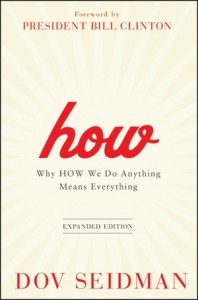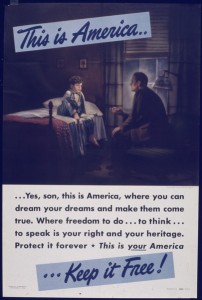Politics
The GOP presidential race gets "rickrolled." Obama's "Komen moment"? Vatican holds unprecendented service of repentance for clergy sex abuse, while in the U.S. a bishop reitres and promptly recants his previous apology. Dickens remembered as a Christian believer and in South Carolina "I Believe" license plates go on sale. In Iran, thousands of women are trained as "ninjas" and we give you archival video of "Nunjas." That and more inside the blog...
Is Santorum the evangelical "flavor of the day"? Megachurch Pastor Rick Warren downsizes by 60 pounds on his biblical "Daniel Plan" diet. Prop 8 (here we go again.) Kosher Congressman? Rabbi Schmuley eyes a run for Congress. Newsweek discovers the persecution of Christians. The Church of England has more women priests than male priests for the first time. (Cue the Vicar of Dibley theme song.) And much more inside the blog....
We're not sure whether they were inspired by Sojourners’ ongoing "What Is An Evangelical" series, but TIME Magazine has published an interesting set of short articles from influential conservatives who answer three separate, but connected questions.
Find out what they are — and offer your answers — inside the blog...

Atari gaming demo center, circa 1980. Image via http://www.wylio.com/credits/Flickr/4734206265
Author Melissa Harris-Perry recently appeared on “The Colbert Report” to speak about her new book, Sister Citizen, which examines a number of stereotypes of African-American women. As he often does, Colbert teed up a common conservative talking point about “going back to he good old days.” Perry’s response kept ringing in my head for days afterward.
She said that there is no time in American history you would want to go back to as a black girl.
The point is simple but compelling. Those in the position of privilege to write history are the ones whose story is most prominently told. So when we talk about going back to some better time, it’s with the lens of that same privilege that we’re looking back.
The fact is that, unless you’re a white, Christian, straight male, there’s little to look back to and say, “Yeah, I was better off back then.”
As someone who self-identifies as an evangelical Christian, often I begin to feel like the subject of a Discovery Channel documentary, particularly in the midst of a heated presidential election cycle.
It’s Evangelical Week here on Discovery! Travel with us as our explorers track the elusive evangelical in its native habitats. Watch as evangelicals worship, work and play, all captured on film with the latest high definition technology. And follow our intrepid documentary team members as they bravely venture into the most dangerous of exotic evangelical locations — the voting booth!
I understand the interest in us evangelicals, I really do. The way much of the mainstream media covers our communities in the news can make us seem like a puzzling subspecies of the American population, not unlike the Rocky Mountain long-haired yeti.
Are we really that difficult to comprehend?
In a word, yes.

Pinetop Perkins via Wylio: http://bit.ly/tCKyOF
It’s good to start a new year by remembering those who passed in the just concluded year. These aren’t the most famous (or infamous), and I didn’t know them personally (or, at best, had met several briefly), but their lives touched mine in three of my passions: American roots music, politics and public life, and baseball.
It’s been a bad year, and the 2012 election year looks to be even worse.
Don’t get me wrong — there were many good and even wonderful things about 2011. I can point to weddings, great things in our family lives, wonderful moments with our children, acts of courage in our local and our global communities, and heroic accomplishments by people of faith and others of good will.
But when it comes to politics and to the media, 2011 was an abysmal year.
Washington is a dysfunctional place where we make the most important decisions about how our public resources should be allocated amidst artificial deadlines set entirely by ideological politics instead of the common good. Rational, thoughtful ideas for reducing the national deficit (while at the same time protecting our vital social safety nets and producing needed jobs) have been replaced by the politics of blame and fear.
And winning — at seemingly any cost — has trumped governing. To disagree with the opposition isn’t enough. Now politicians and pundits feel compelled to destroy their opponents’ character, integrity, patriotism, and even attack their faith.
I first heard the term "evangelical" in the 1980s, about the time the Swaggarts and Bakkers were imploding. Christianity needed a new name for sane, intellectually sound faith.
"Born-again" had been sullied by the televangelists and worn out by Debbie Boone’s explanation of how she justified singing the lyrics to “You Light Up My Life.”
"Jesus Freak" had died with the Peace movement.
We needed another word to separate true Christians from fake ones; sheep from goats; serious believers from those who merely checked the “Christian” box on their driver’s license application because Jew, Muslim or Ekkankar didn’t apply.
(Sometimes I wonder if all the denominations in Christendom are merely a list of the nomenclature we’ve used to separate Us from Them.)
Despite all that I knew 40 years ago about the policy and politics of the Vietnam war, I learned much more by simply listening to veterans. Late at night, often in bars, I heard about the war from the experience of those who fought it. And that taught me more than everything I had ever read. With tens of thousands of vets coming home from Iraq in the next two months -- and many more returning from Afghanistan over the next two years -- we'll have plenty of opportunities to say thanks, and then just listen.
I always notice something when speaking to a mostly secular audience. Many people have been so hurt or rejected by the bad religion in which they were raised or have encountered elsewhere over the course of their lives, and, quite understandably, they are skeptical and wary of the faith community. But when someone looks like a faith leader (this is where the ecclesial robe helps ) and says things that are different from what they expect or are used to, their response is one of gratitude and the moment becomes an opportunity for healing.
After I spoke Sunday and joined the circle around the White House, person after person came up to me to express their thanks or simply to talk.
My favorite comment of the day came from a woman who quietly whispered in my ear, "You make me almost want to be a Christian."
Nearly 50 million Americans are currently living below the poverty line (that is $22,000 for a household of four) and half of them are working full time jobs.
In our current economic system, the "happiness" of the super-elite is secured while the lives, liberty, and access to basic needs of the rest suffer. This isn't the American Dream and it isn't God's dream either.
Social justice index: USA No. 27 of 31. Democrats in Congress attempt to eat on $4.50 a day to protest potential budget cuts. Republicans shift focus from jobs to God. OpEd: Obama, the G20 and the 99 percent. In Congress, the rich get richer. The Shadow Superpower. And the U.S. sues South Carolina over immigration law.
FoxNews shuns pro-immigrant voices. How do we repair souls returning from the war? Does Christianity translate into public policy? Lobbyists role in 2012 fundraising. Oakland mayor promises "minimal police presence" at OWS protests. Cain says he doesn't need to know foreign policy details. And only 40 percent of Americans correctly identify Romney as Mormon.
Baby steppin': Economy grew 2.5 percent in the third quarter. Democrats first offer: $3 trillion for debt. Immigration is a faith issue. Harsh rhetoric to derail the GOP? The canon of St. Paul's Cathedral in London resigns over plans to evict Occupy London protesters. Elizabeth Warren and the #OccupyWallStreet election test.
Week end's latest news as well as a few pieces you might have missed from the past few days. Check back on Sunday for a review of "The Mighty Macs," a few longer essays from SoJo staff and friends, and the latest news on the U.S. troop withdrawal from Iraq after nine years of war.
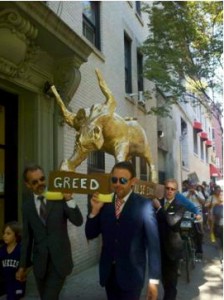 Editor’s Note: In light of the recent protests at #OccupyWallStreet and around the world, we have revisited Jim Wallis’ 2010 book Rediscovering Values: On Wall Street, Main Street, and Your Street and picked out some passages that are particularly pertinent to what we are seeing in our nation today.
Editor’s Note: In light of the recent protests at #OccupyWallStreet and around the world, we have revisited Jim Wallis’ 2010 book Rediscovering Values: On Wall Street, Main Street, and Your Street and picked out some passages that are particularly pertinent to what we are seeing in our nation today.
The Passover of the Jews was near, and Jesus went up to Jerusalem. In the temple he found people selling cattle, sheep, and doves, and the money changers seated at their tables. Making a whip of cords, he drove all of them out of the temple, both the sheep and the cattle. He also poured out the coins of the money changers and overturned their tables. He told those who were selling the doves, “Take these things out of here! Stop making my Father’s house a marketplace!” His disciples remembered that it was written, “Zeal for your house will consume me.”
– John 2:13-17
Interestingly, in his turning over of tables, Jesus specifically targeted the merchants who were selling doves. Doves were the least expensive sacrifice permitted to be offered in the temple, and, therefore, were often bought by the poorest of the pilgrims.
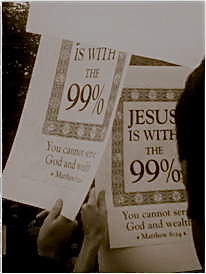
[When Jesus turns over the tables] we see a man enraged at injustice and passionately confronting those who exploit the poor. We also learn that there are some things that we all should get angry about, that there are situations where the only appropriate response is confrontation…
 First, we were sold a lie. We were sold an illusion that promised the American Dream was as close as our next purchase. That we could pursue our selfish interests without thought to the consequences, because the “invisible hand” would work it all out in the end. We were told that we did not need to work for wealth, that it would come if only we put our money in the hands of the right stock broker, mutual fund, or stock…
First, we were sold a lie. We were sold an illusion that promised the American Dream was as close as our next purchase. That we could pursue our selfish interests without thought to the consequences, because the “invisible hand” would work it all out in the end. We were told that we did not need to work for wealth, that it would come if only we put our money in the hands of the right stock broker, mutual fund, or stock…
Second, the rules of the game failed. It was supposed to be simple. Work hard, get ahead, buy a home, and tuck some money away for the future in a 401(k). If you followed those rules, everything would work in your favor. But good jobs have disappeared, wages have been garnished, and 401(k) savings have disappeared. The rules of the game seem to have worked for those who set the rules, but not for those who played by them.
Third, our good was supposed to trickle down. We were promised that as the rich got richer, the rest of the country would prosper as well. If we handed our finances and ultimately our lives over to those who knew the market the best, it would benefit us all. If we took the virtues of the market and made them the virtues of our lives, we, too, would experience boundless prosperity. Fulfillment would come if we could just trust the market enough to work for us…
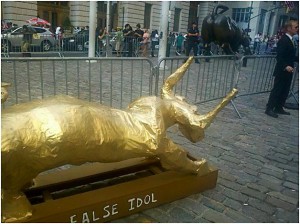 The market has become our “golden calf,” our idol of ultimate allegiance… This is when God—and then Moses—got angry. Why? Just because they built a golden calf? No. The calf could have been just a work of art, a statue to enjoy. What made the calf an idol was that the people gave the newly created calf the credit for leading them out of Egypt. They gave to the golden calf credit and attributes that belong only to God…
The market has become our “golden calf,” our idol of ultimate allegiance… This is when God—and then Moses—got angry. Why? Just because they built a golden calf? No. The calf could have been just a work of art, a statue to enjoy. What made the calf an idol was that the people gave the newly created calf the credit for leading them out of Egypt. They gave to the golden calf credit and attributes that belong only to God…
Today, instead of statues, we have hedge funds, mortgage- backed securities, 401(k)s, and mutual funds. We place blind faith in the hope that the stock indexes will just keep rising and real estate prices keep climbing. Market mechanisms were supposed to distribute risk so well that those who were reckless would never see the consequences of their actions. Trust, security, and hope in the future were all as close to us as the nearest financial planner’s office. Life and the world around us could all be explained with just the right market lens. These idols were supposed to make us happy and secure and provide for all our needs. Those who manage them became the leaders to whom we looked, not just for financial leadership, but direction for our entire lives. That is idolatry.
Rich and poor alike were sucked into making heroes out of those who seemed to be able to turn everything they touched into gold. Holocaust survivor and Nobel Peace Prize recipient Elie Wiesel lost virtually all of his personal wealth and his foundation’s, up to $37 million, to Bernie Madoffs Ponzi scheme. “We gave him everything, we thought he was God, we trusted everything in his hands.”‘
(All pictures are courtesy of Catholics United, who produced the ‘golden calf’. Extracts come from pages 19-29 of the hardcover edition of Rediscovering Values.)
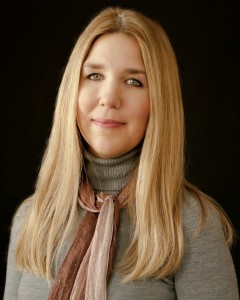
Evangelicals had always seemed like the "other" Christians. They were the ones who didn't celebrate Advent or baptize babies. They were the ones who went colleges that required pledges not to drink, smoke or dance. They were the ones who frowned upon evolution or "free-thinking."
As a child of the 1970s and '80s, I saw evangelicals as politically and socially conservative -- ever skeptical of culture and worried about what we were reading and watching. They bobbed for apples at "Harvest" parties instead of trick-or-treating on Halloween. They were the ones telling Kevin Bacon he couldn't be footloose and fancy free -- or maybe those were "fundamentalists." Did it matter? Was there even a difference?







